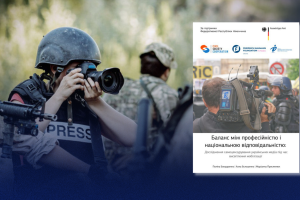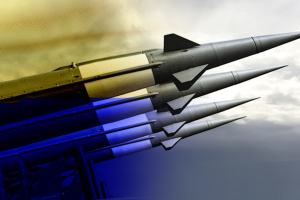Donbass: public opinion about conflict
Press Release
The public opinion poll was conducted by the Ilko Kucheriv Democratic Initiatives Foundation and the Sociological Service of the Razumkov Center from May 11-16, 2016. 2,016 respondents from the age of 18 and higher in all regions of Ukraine were surveyed. The theoretical margin of error is no higher than 2.3%.
Polling was financed by the MATRA Program of the Embassy of the Netherlands and the National Endowment for Democracy (NED, U.S.). For comparison, data of the public opinion polls conducted by the Ilko Kucheriv Democratic Initiatives Foundation jointly with the Kyiv International Institute of Sociology {KIIS) from October 9-19, 2015, are also presented.
· Public opinion on the “price of peace” remains relatively stable. Indeed, the majority of the population of Ukraine (70%) is eager to end the military conflict in the Donbas region through compromise (in October 2015 – 75%). However, only 22.5% of the people agree to any compromises in order to achieve peace, while 47% believe that only some compromises could be justified. 14% of the surveyed support the military path of resolving the conflict in the event of the obvious victory of one of the sides.
· There are certain regional differences regarding the degree of acceptable compromises. As such, reaching any compromises for the sake of peace is more supported in the South (33%), in the East (29%) and in the Donbas region (29%). In the Western and Central regions of Ukraine, only 15% and 17.5% are ready for that. The most significant changes in public opinion regarding the “price of peace” were observed in the Ukrainian-controlled part of the Donbas region. Indeed, while in October 2015 the idea of “peace at all costs” was supported by 59.5% of the population in the Donbas region, in May 2016 this figure dropped to 29%. A share of those who are ready for some, but not all compromises, on the contrary, increased from 35% to 49%, accordingly.
· The most popular “recipes” for peace in the Donbas regions are forcing Russia to pull out of the conflict through international sanctions and pressure (41%) and the successful renewal of а normal life in the Ukrainian-controlled parts of the Donetsk and Luhansk oblasts (28%). The majority of those who support the latter option lives in the Donbas region (45% of the residents of the controlled parts of the region).
· Ukrainian public opinion on the political future of the so-called “DPR” and the “LPR” remains relatively stable: nearly half of the population (48%) feels that these territories must be returned to Ukraine and remain within it on the previous conditions. Another 25% are convinced that the uncontrolled regions should be a part of Ukraine, but can count on a greater level of independence from the central government.
· Ukrainian-controlled territory in the Donbas saw significant changes in public opinion on this issue over the past half year. In the autumn of 2015, the proponents of the return of these territories to Ukraine were almost equally split between those who were ready to grant these regions greater authority (27%) and those who were not (28%). Another 19% then spoke of the possibility of creating an autonomy of these territories within Ukraine. In May 2016, however, most people (42%) were against granting rebel-held Donbas territories additional political powers. Yet, 30% of the residents are still ready to give more powers to the currently uncontrolled territories in Donbas.
· At the same time, in the South of Ukraine changes were the opposite. Specifically, a share of those ready to grant greater autonomy to the rebel-held territories after they return under Ukrainian control grew from 29% to 39.5%, while the number of those who would prefer the status quo, on the contrary, fell from 41% in October 2015 to 26% in May 2016.
· 43% of the population deem it impossible to hold elections in the rebel-held Donbas territories in the foreseeable future. 35% of the residents in the liberated parts of the Donbas region, 34% in the East, 33% in the South, 52% in in the West, and 51% in the Central region adhere to this position. At the same time, 22.5% of the people believe that the elections could be held if the OSCE and other international organizations have full control of the process of free and fair elections, 21% – if they are held in full compliance with Ukrainian legislation, 20% – if all Russian military forces are withdrawn from “DPR” and “LPR”, and 18% – if Ukraine regains control over its border with Russia.
· Idea of deploying an international peacekeeping contingent in Donbas is generally supported in Ukraine (58% of the population are in favor of it). Since 2015, the level of its support has grown by 5%. Meanwhile, 21% of Ukrainians are against the deployment of international peacekeeping forces (in October 2015 this figure was 27%). Since 2015, there have also been visible regional changes: in October 2015, only in Western and Central Ukraine the majority of the population had a positive attitude towards the deployment of a peacekeeping contingent (70% and 59%, accordingly). In May 2016, the East of Ukraine also became supportive of the idea: 55% had a positive attitude towards it, while 26% – negative (in October 2015, 33% and 39% were for and against it, accordingly). Public opinion on this issue has also changed in Donbas: in October 2015 only 16% supported the idea and 68% – did not, while in May 2016 number of the proponents grew to 39%, and the number of opponents fell to 36%.
· There is no consensus in public opinion on preferred policy option of dealing with rebel-held territories. 23% of the population supports full isolation of the so-called “DPR” and “LPR”, 19% – partial isolation allowing the residents of these regions to leave the territory and receive payments on Ukrainian-controlled territories, 12.5% – milder partial isolation that would allow for preserving certain economic and trade contacts, while 16% – mild re-integration of the region (gradual renewal of personal and economic ties, holding of the elections, maintaining contacts with self-proclaimed leaders, and granting the so-called “special status”, etc.). 5% of Ukrainians think that Ukraine should recognize the independence of these territories and establish ties with them as separate states.
· 42% of the people support putting the issue of the status of temporarily occupied territories on a referendum, while 37% are against it. In Donbas, 49% are in favor of this idea and 26% oppose it.
· 46% of the population support the idea the official recognition of rebel-held Donbas territories as temporarily occupied and the severing ties with them, while 26% do not support it. However, there are significant regional differences on this issue. In the Western and Central regions, 67% and 53% of the people, respectively, support this initiative. In the South of Ukraine, public opinion is divided equally among proponents, opponents, and the undecided: 34%, 34%, and 32%, respectively. In eastern oblasts (Dnipropetrovsk, Zaporizhzhia, and Kharkiv), the local population is also evenly divided (37-38%) between those in favor and against such an initiative. In the Donbas region, the relative majority (41%) is against designating the territories of “DPR” and “LPR” as temporarily occupied, 21% are in favor, and 38% are undecided.








